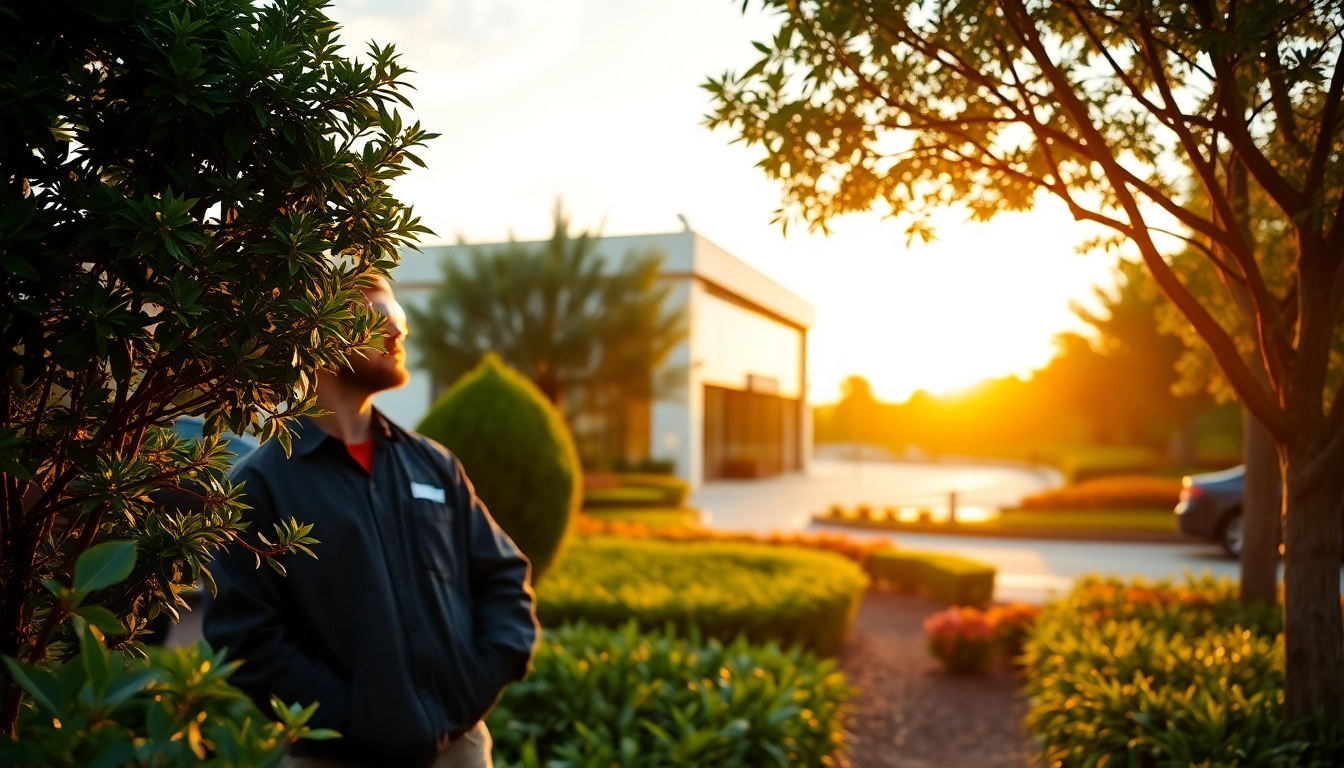Understanding Commercial Landscaping Services
Commercial landscaping is a crucial aspect of maintaining the aesthetic appeal and functionality of business spaces. This type of landscaping is not only about planting flowers and mowing lawns; it’s a comprehensive service that involves creating and maintaining outdoor spaces that enhance the overall environment of commercial properties. Whether you are managing a retail outlet, an office park, or an industrial complex, partnering with commercial landscaping contractors can help you achieve optimal results.
What Are Commercial Landscaping Contractors?
Commercial landscaping contractors are specialized professionals who provide comprehensive landscaping services tailored to meet the specific needs of businesses and institutions. Unlike residential landscaping, which focuses on individual homes, commercial landscaping addresses larger spaces often being utilized by corporate and governmental entities. These contractors offer a broad range of services, including landscape design, installation, maintenance, irrigation, botanical gardens, and outdoor features such as patios and walkways.
Key Differences Between Residential and Commercial Landscaping
The primary differences between residential and commercial landscaping stem from scale, design approach, and maintenance requirements. Residential landscaping typically focuses on creating pleasant and functional outdoor spaces for individual homeowners, often prioritizing aesthetics and personal taste. In contrast, commercial landscaping is governed by the need for practicality, safety, and regulatory compliance.
Commercial properties often require durable materials, sustainable practices, and efficient maintenance routines due to their higher foot traffic and usage. For instance, a commercial landscape might involve the installation of xeriscaping to reduce water use, whereas residential options may favor visually appealing but less practical choices. Furthermore, commercial projects usually entail more comprehensive planning due to zoning regulations and corporate branding standards.
Types of Services Offered by Contractors
Commercial landscaping contractors offer a diverse array of services tailored to the unique requirements of business properties:
- Landscape Design and Planning: Collaborating with clients to define the vision for the outdoor space, ensuring plants, layout, and materials align with branding and functional goals.
- Installation Services: Implementing the landscape design, which may include planting, installing irrigation systems, and creating hardscapes such as paths, patios, and retaining walls.
- Maintenance Services: Providing ongoing care, including mowing, fertilizing, pruning, and seasonal cleanup to keep the landscape healthy and attractive.
- Irrigation Management: Designing and maintaining irrigation systems that conserve water while ensuring consistent hydration for plants.
- Seasonal Displays: Installing seasonal decorations and displays, such as holiday lights and flower arrangements, to enhance the property’s visual appeal.
- Snow Removal: Ensuring landscapes are safe during winter months through snow clearing and ice management.
Benefits of Hiring Commercial Landscaping Contractors
Boosting Curb Appeal and First Impressions
The exterior appearance of a business can significantly affect first impressions. A well-maintained landscape creates an inviting ambience that can attract potential customers and clients. Professional landscaping improves curb appeal, signaling that a business values its environment and, by extension, its customers. Moreover, using seasonal flowers and plants can provide a dynamic aesthetic that changes throughout the year, keeping the appearance fresh and engaging.
Increasing Property Value Through Professional Design
A well-executed landscaping design not only serves aesthetic purposes but also increases the overall value of a property. Properly designed landscapes can return up to 150% of the initial investment, providing tangible benefits for property owners. Well-placed trees and shrubs can provide shade, minimizing heating and cooling costs, further enhancing the property’s marketability.
Long-term Cost Savings and Maintenance
While hiring professional landscaping contractors incurs initial costs, the long-term savings can be substantial. Professionals understand local ecosystems and can recommend plant varieties that are drought-resistant, reducing water use and maintenance costs. Furthermore, regular maintenance by professionals can prevent landscape deterioration, minimizing the need for more extensive and costly work in the future.
Choosing the Right Commercial Landscaping Contractor
Factors to Consider When Hiring
Selecting the right landscaping contractor requires careful consideration of several factors:
- Experience and Expertise: Look for contractors with significant experience in commercial landscaping and a proven track record of successful projects similar to yours.
- Services Offered: Assess whether the contractor offers a comprehensive range of services and if they align with your specific landscaping needs.
- Licensing and Insurance: Ensure that the contractor is properly licensed and carries adequate insurance to protect against liability in case of accidents or damages during the project.
- Environmental Consciousness: Choose contractors who employ sustainable practices and can provide eco-friendly solutions for your landscaping.
Evaluating Crew Experience and Service Options
The skills and expertise of the crew performing the work are critical to achieving quality results. A reputable contractor should have certified and trained personnel familiar with various landscaping techniques and technologies. Inquire about their training programs and staff turnover rates to gauge stability.
Checking Reviews and Past Projects
Conducting due diligence is vital when choosing a commercial landscaping contractor. Check online reviews and testimonials, and ask for references to learn more about past projects and client satisfaction. Visit completed project sites whenever possible to assess the quality of their work firsthand.
Cost Factors in Commercial Landscaping Projects
Analyzing Cost per Square Foot
Understanding the cost structure for landscaping services is crucial for effective budgeting. On average, commercial landscaping costs can range from $2 to $10 per square foot, depending on factors such as location, plant selection, and labor. Complex projects may incur higher costs due to additional materials and specialized labor.
Understanding Pricing Structures
Contractors often use varied pricing structures, such as fixed bids for defined projects or hourly rates for maintenance services. It’s essential to understand these pricing models and what factors may influence final costs, including material choices and seasonal variations in labor costs.
Budgeting for Seasonal Maintenance
Landscaping maintenance costs can vary significantly with the seasons. Proper budgeting should account for peak seasons when maintenance needs are more demanding, as well as winter operations like snow removal. Regular maintenance not only keeps landscapes healthy but can also prevent more costly repairs from neglect.
Future Trends in Commercial Landscaping
Sustainability and Eco-Friendly Practices
As awareness of environmental concerns grows, commercial landscaping is increasingly focusing on sustainability. Practices such as xeriscaping, which involves using drought-resistant plants, and the incorporation of rain gardens for stormwater management are becoming more prevalent. These eco-friendly practices not only reduce environmental impact but can also enhance a company’s image as a responsible corporate citizen.
Smart Landscaping Technologies
Technological advancements are also reshaping the landscaping sector. The integration of smart irrigation systems and landscape management software allows for improved resource use and greater efficiency. Businesses can benefit from automated systems that monitor weather conditions and adjust watering schedules accordingly, saving both water and money.
Design Innovations and Aesthetic Trends
Current trends in commercial landscaping include the use of native plants to reduce maintenance requirements and the enhancement of outdoor spaces to serve as extensions of indoor environments. Features like green roofs, living walls, and multifunctional outdoor spaces are gaining traction among businesses aiming to maximize the utility and enjoyment of their landscapes.



